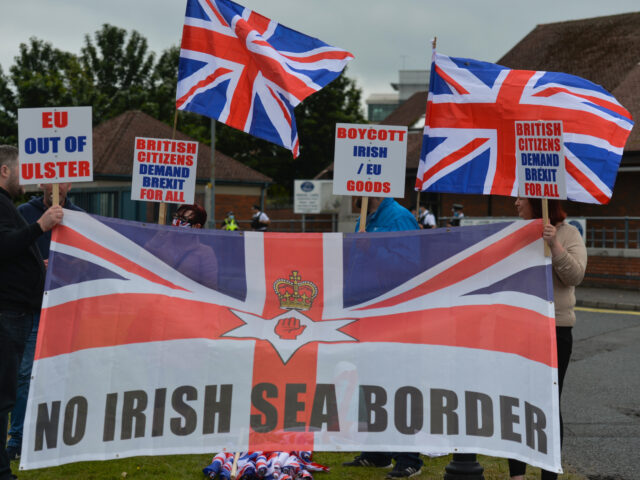Prime Minister Rishi Sunak has had to “pause” a new deal with the European Union on Northern Ireland as Brexiteers in the Province and his own party threaten to oppose a sell-out.
Sunak, though he supported Brexit as a then-relatively obscure MP in the 2016 referendum on Britain’s membership of the European Union, is widely reported to have opposed taking a firm line against Brussels as Boris Johnson’s Chancellor of the Exchequer.
Today, there are fears he is continuing to attempt to appease the bloc as premier — for example, by considering scrapping a new law which would empower the British government to disapply elements of the so-called Northern Ireland Protocol if they cause significant disruption to UK governance and intra-UK trade.
Home Secretary Suella Braverman, on the other hand, has insisted passing the law is an essential negotiating tool, as it will allow the British government to act unilaterally if necessary, giving Brussels good reason to cooperate to minimise any disadvantage to themselves.
The Northern Ireland Protocol remains a thorny issue, the agreement having left Northern Ireland still partially inside the EU and erecting an internal customs border between it and the British mainland. EU officials are accused of over-enforcing it with malicious intent.
The Protocol itself is part of the Brexit deals between the United Kingdom and European Union, ostensibly aimed at keeping open the border between the British province of Northern Ireland, or Ulster, and the EU-run Republic of Ireland, or Ireland/Eire. Ongoing negotiations to reform it are supposedly aimed at resolving several issues it has created between the UK and the EU.
The trouble for those Conservative politicians who would prefer to roll over to Brussels’ demands in these negotiations, is that the largest British Unionist political party in Northern Ireland, the pro-Brexit Democratic Unionist Party (DUP), remains totally unwilling to accept arrangements that leave their Home Nation half-in the EU and half-out of the UK. Indeed, the DUP has moved to prevent Ulster’s power-sharing regional legislature and executive from forming as long as these arrangements persist.
Any new deal between London and Brussels on Northern Ireland, they insist, must pass their “seven tests”, laid out in the Belfast Telegraph as follows:
The Acts of Union described in test one are date from 1801 and formed the United Kingdom of Great Britain and Ireland, which then still included what is now the EU-run Republic of Ireland, or Ireland/Eire, into a single state.
The DUP believes that the Northern Ireland Protocol fundamentally undermines the resulting Union, by leaving one of its Home Nations — England, Scotland, Wales, and Northern Ireland — partially inside a foreign power’s customs area and regulatory regime, overseen by foreign courts, and reinforced by an internal border between it and the British mainland.
Some have compared the way the Northern Ireland Protocol functions in this context to Ottawa demanding Alaska conform to Canadian law and answer to Canadian courts — an unworkable nonsense, in other words.
It was reported on Sunday night that Sunak would be willing to press ahead with a deal that did not meet the DUP’s tests — the Conservatives have proved much more willing to take a stand against Brexiteer allies than the European Union since 2016 — with Downing Street signalling to The Times that they believed it would be “unhelpful” to “set a bar that is not necessarily in the interests of those we are trying to negotiate for” in Northern Ireland.
Less than a day later, however, it seems that the strength of feeling against another sell-out — when Johnson signed off on the Protocol it was widely regarded as being essentially the same as arrangements proposed by his Remain-voting predecessor Theresa May — from not just the DUP but also the Brexiteer wing of Sunak’s own party has forced a rethink.
“The deal won’t fly unless it deals with the fundamental point which is Northern Ireland having EU laws applied to it. [Sunak’s] calculation is to try to get something more on that side of things and see whether the EU will budge on courts and laws,” explained a top DUP source in comments to The Telegraph, which is close to the Conservative Party.
“The blowback in the Tory party and [from] unionists has caused him to pause. Whether he is going to stop completely is another matter,” they added.
Another source within the European Research Group (ERG) — the leading Brexiteer faction within Sunak’s party — suggested there had been a “cack-handed attempt to bounce both the Cabinet and the wider [Conservative] Parliamentary Party into rapidly agreeing a deal, which the DUP has not even consented to,” but that it was apparently “unravelling rapidly.”
There seems to be particularly fierce opposition, both public and private, to dropping the aforementioned bill which would empower the government to override parts of the Protocol as a sop to Brussels, with The Telegraph‘s ERG source branding this proposed abandonment of this powerful leverage “madness” and asking: “Who on earth is giving the PM daft advice like this?”
In recent months, there has been acknowledgement even among leading EU officials that the Northern Ireland issue has been mishandled, with the leader of EU Ireland, Leo Varadkar, conceding that the Protocol was “imposed” on the British province “against the will of [British] unionists”.

COMMENTS
Please let us know if you're having issues with commenting.